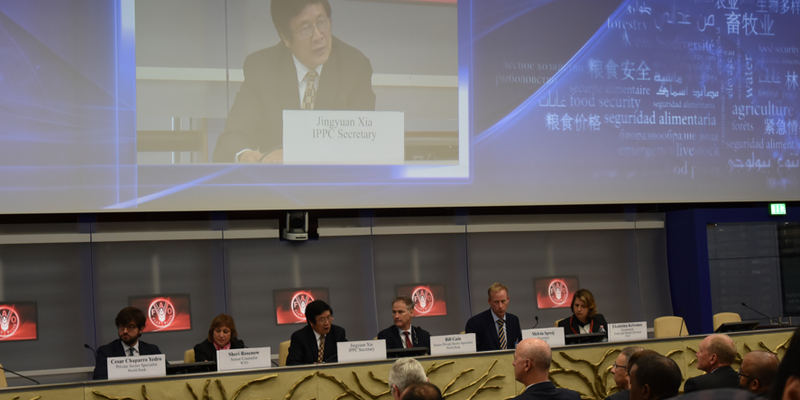The IPPC Seminar on Plant Health and Trade Facilitation held at the FAO Headquarters
Posted on Vie, 13 Oct 2017, 12:01

The IPPC Seminar on Plant Health and Trade Facilitation - the seventh in a series - took place at the FAO Headquarters, Rome, Italy on October 10th 2017. The seminar was chaired by IPPC Secretary Jingyuan Xia, and attended by over 100 participants, including participants of IPPC SPG meeting, permanent representatives to FAO and FAO staff. The seminar brought together representatives from the World Trade Organization (WTO), the Standards and Trade Development Facility (STDF), the World Bank and the FAO Trade and Markets Division.
Sheri Rosenow, Senior Counselor of the WTO presented on the WTO perspective on Plant Health and Trade Facilitation. She described the importance of the Trade Facilitation Agreement (TFA), implementation of the TFA, detailed the concept of the single window as outlined by the TFA, and presented information on the TFA section on Special and Differential Treatment (SDT). A description of the purpose of Committee s on Trade Facilitation was also described.
Melvin Spreij, Secretary of the STDF described the World Trade Organization s SPS Agreement, the development and implementation of SPS measures, and described in detail lessons learnt from the STDF s work towards reducing trade costs and improving health protection. He also described various initiatives towards paperless trade (SPS e-certificates).
Bill Gain, Global Lead of the Trade Facilitation and Border Management Unity of the World Bank presented on recent lessons on trade facilitation and plant health. He detailed current changes facing borders, key aspects of a modern border management approach, the concept of the single window system and conditions enabling it, as well as the implementation lessons learnt. He emphasized the need for a coordinated border management approach to address common challenges and outlined the benefits for each border and trade facilitation stakeholder.
Cesar Chaparro Yedro, the World Bank Group s Coordinator for Enabling the Business of Agriculture , described the background of the programme, its country coverage, thematic coverage, and the methodology used by the programme. In its current stage, the programme has finalized data collection for 62 countries and is now analyzing policies, and refining its methodology. Some findings from the programme were detailed, including data indicating that it is cheaper and faster to obtain a phytosanitary certificate in countries that have electronic processes in place and that can conduct inspections and issue certificates on-site.
Ekaterina Krivonos, Economist of the FAO Markets and Trade Division presented on major links between phytosanitary controls and agricultural trade, and detailed examples of SPS measures with high economic impact, and the FAO s capacity development work to support the effective application of trade rules. She also emphasized the importance of in-house collaboration to strengthen countries abilities to benefit from agricultural trade while safeguarding plant health.
IPPC Secretary Xia highlighted the IPPC perspective on Plant Health and Trade Facilitation in four areas: 1) Setting relevant international standards for phytosanitary measures (ISPMs) to promote safe and efficient trade; 2) Strengthening of the capacity to promote safe and efficient trade at national level; 3) Developing IPPC trade facilitation action plan to promote safe and efficient trade; and 4) Enhance communication and international cooperation to promote safe and efficient trade. He concluded the Seminar stressing the important joint collaboration of all actors involved in facilitating trade, and the readiness of the IPPC community to fully participate in this process.

